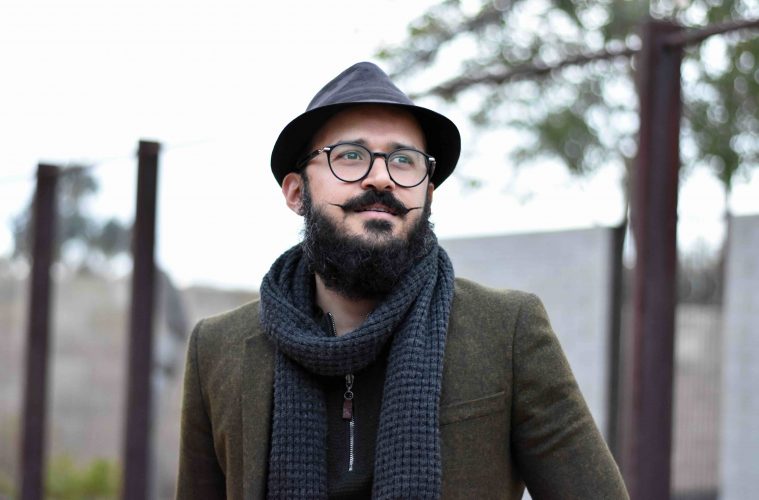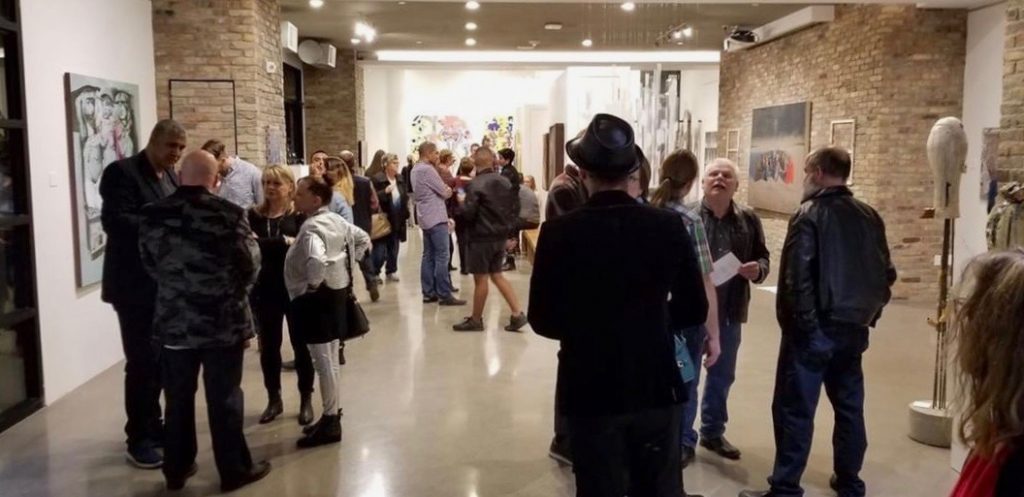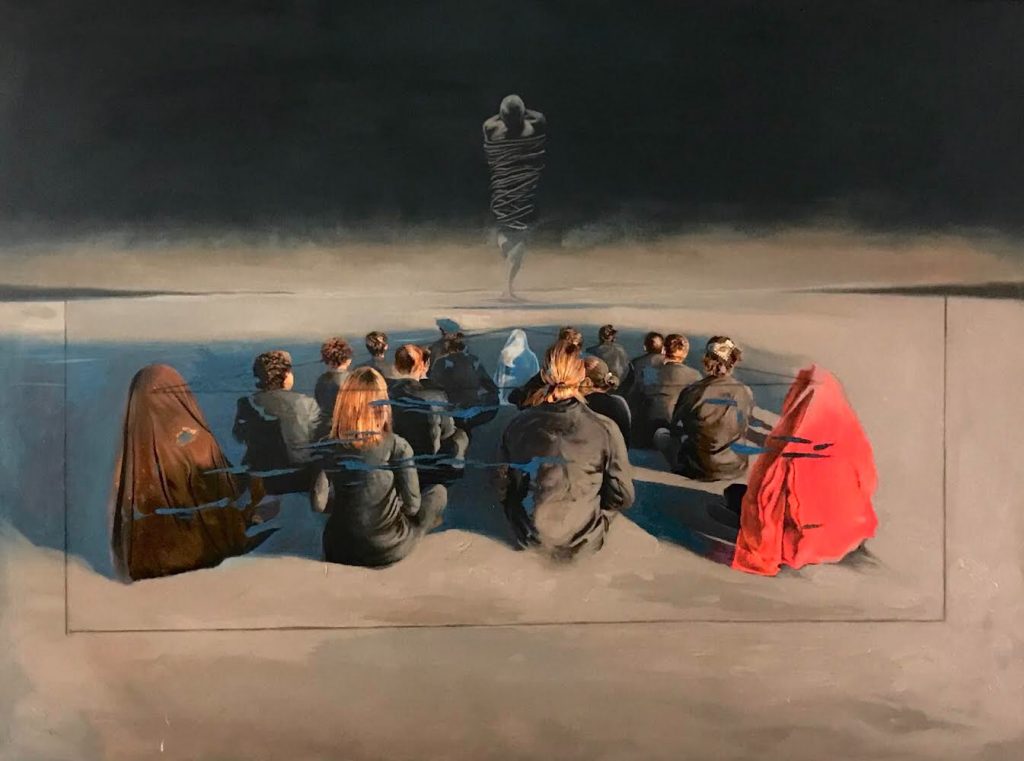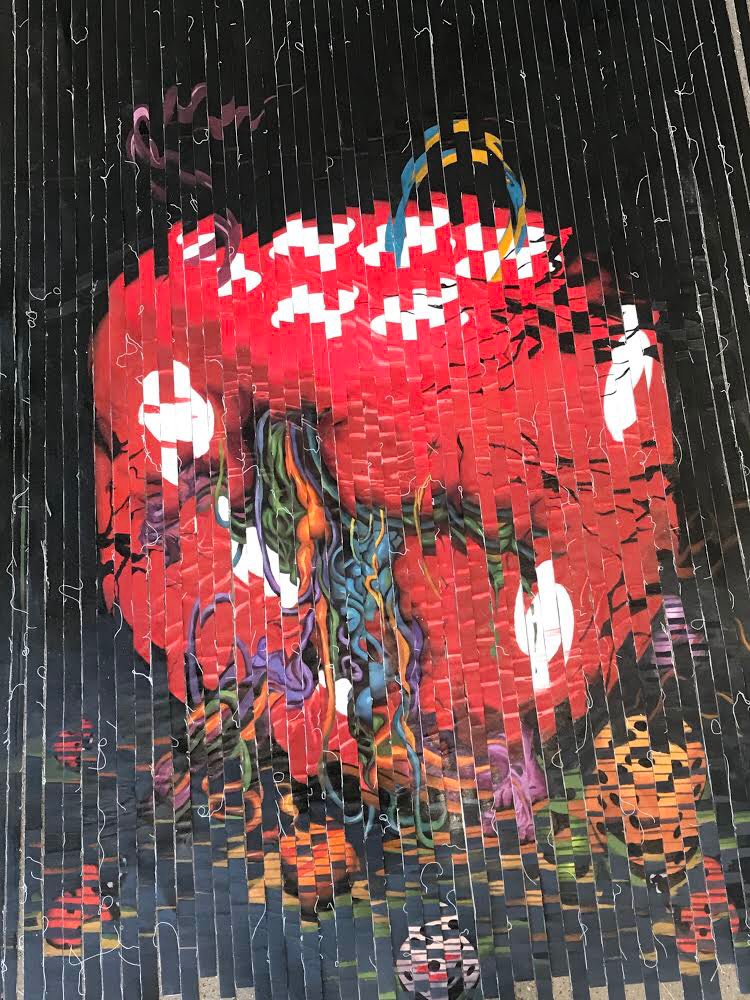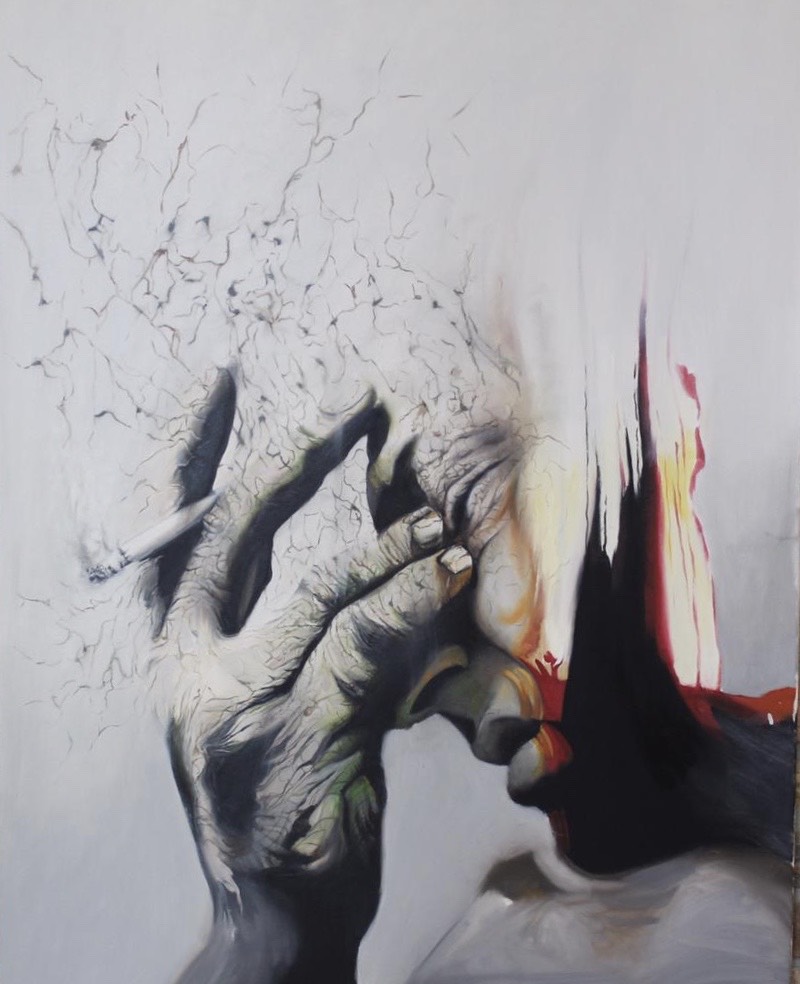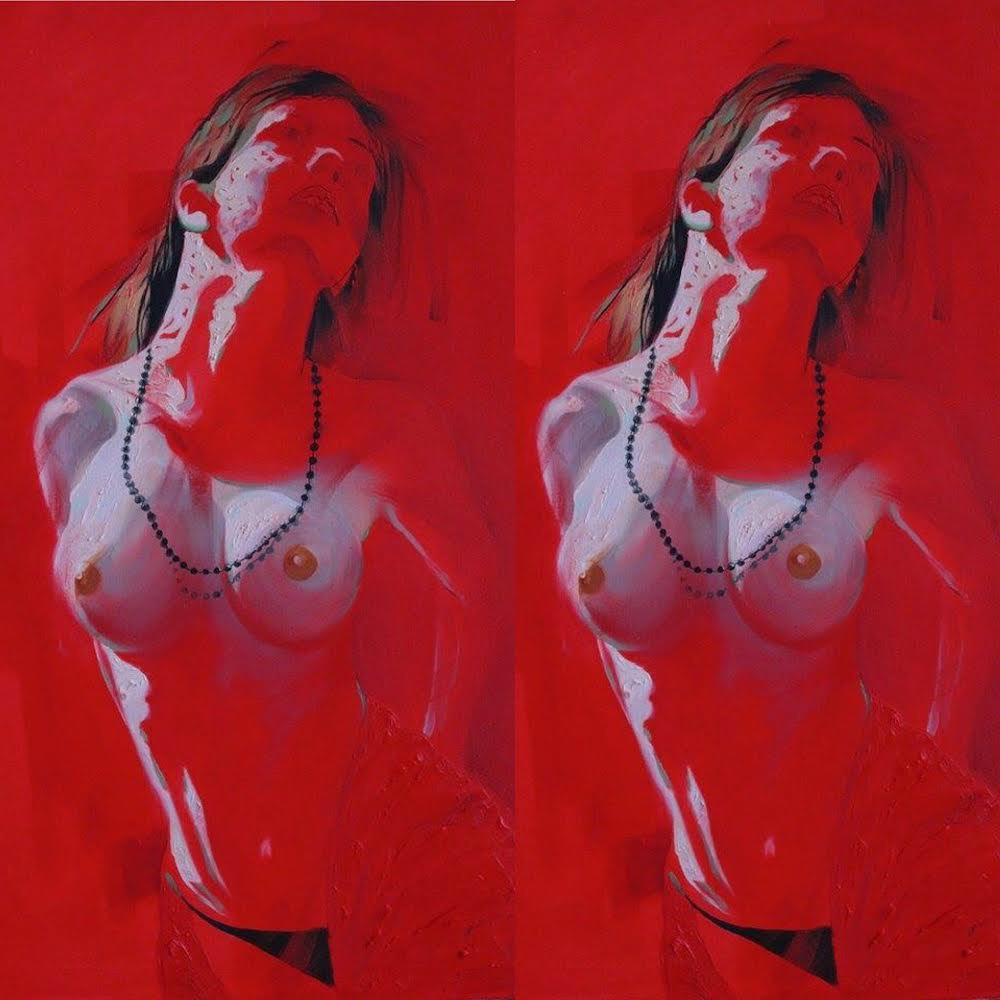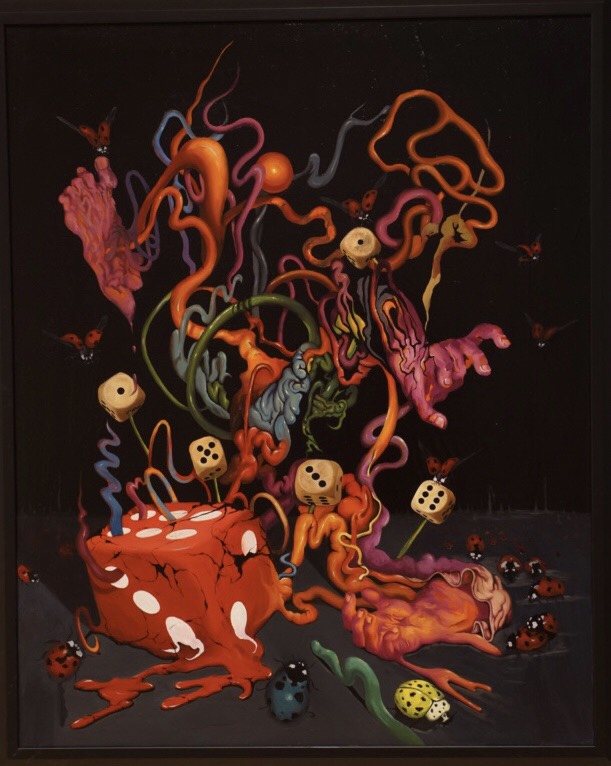It’s another balmy winter evening around downtown Phoenix. There’s a DJ playing rhythmic music amid contemporary works of art and a throng of people in conversation. It’s First Friday, but we’re not on Roosevelt Row. The celebration is the opening of a new art gallery in a luxury apartment complex across from the Phoenix Art Museum. Bassim Al Shaker, the individual who made all this happen, is chatting up visitors, and there’s been a smile on his face since the doors opened. He knows to enjoy the moment, because as a young immigrant artist, nothing can be taken for granted.
Al Shaker has come a long way from his hometown of Baghdad, and through it all, he has kept his positive outlook intact. The politically tenuous environment he grew up in and his near-death experience have been well documented in numerous publications, including The New York Times. The media portrayal of bombings in Iraq and neighborhoods in shambles is accurate; however, Al Shaker prefers to focus on Iraq’s rich history and the culture that has endured despite all the hardships. “The art is in our blood,” he said. “We’re the oldest country in the world. [Iraq] taught the world so many things. We taught the world how to write.”
From the beginning, he was surrounded by family that had a great appreciation for the arts. “I come from an art family,” he said. “My uncles are all artists. My dad is an artist. My uncle was a famous drummer in the Middle East. They taught me a lot.”
The young Al Shaker would draw every chance he got. He would draw at home or anywhere he could set his paper and pencil. He found himself in trouble for not showing up at his assigned classroom; instead, he would be in the studio drawing or painting. At an early age, Al Shaker already had the ability to render anything with precise detail. In fact, he drew so well he had to prove himself to a teacher when she did not believe he had created one particularly adept work. She told him to replicate the work in front of her. He not only replicated the image, but he improved upon it, finally convincing the teacher.
This innate talent would allow Al Shaker to get into a specialized arts school. “This high school, they have music, they have actors, they have movies, everything,” he said. “Not everyone could go to this high school. You needed to have a test, and they apply every year more than eight hundred to a thousand students, and they accept just fifty to sixty. When I applied, in the beginning, my family, they didn’t know I applied to this school.”
Al Shaker’s hard work and his willingness to bet on himself paid off when he was invited to an important art show that took place in Egypt. “I won a gold medal,” he said with a laugh. “It’s very funny, when I say gold medal, because I’m not a sport guy. I don’t know why they gave me a gold medal. It was for the most detailed painting in the Middle East.”
After winning the award, Al Shaker returned to Iraq and attended the College of Fine Arts at the University of Baghdad. He would hone his craft to a point where he was chosen to be one of a select group of artists to represent the country of Iraq in the 55th Venice Biennale in 2013. This inclusion to the prestigious international exhibition would prove a catalyst for the young artist’s life and career. Gordon Knox, the director of the ASU Art Museum at the time, saw his work and invited Al Shaker to participate in the International Artist Residency Program at Combine Studios in downtown Phoenix.
Al Shaker arrived in the U.S. speaking no English. Gradually, he is becoming more and more comfortable with the language. “When I came here, I started from zero. I don’t have a language. I speak ‘yes’ and ‘no,’ and I speak ‘hello’ and from one to ten. The ASU Art Museum, they give me someone with me always. Her name is Layal Rabat. She’s from Syria, and she’s one of my best friends. She translated everything. She introduced me to all the people I know now.”
Although Al Shaker was thankful for the assistance from the ASU Art Museum, his lack of mastery over the English language made him feel isolated early on. He endured an existential crisis when he stayed inside his home for ten days straight to really examine his decision to relocate halfway around the world and to ask if this would ultimately be beneficial to his art.
“You know, when you come from all big festivals,” Al Shaker said, “all the media come to you, all the things. When you come here and then you feel alone, it’s just very hard, you know. You feel alone because the language. I decided, maybe I will go to [another] country in the Middle East because I can’t go back to Iraq, or maybe I will stay here and start from zero. So I stayed here. I went outside, talked with the people. Just read one sentence or read a question and at home repeat it like ten times. Then go outside and just ask the people. So I hear them – what they talk about. From there I changed my life.”
Al Shaker has had to be truly resourceful, moving from one space to the next in order to continue making art. After a productive stint in the residency program at ASU, he committed to staying in the U.S. and moved to Grant Street Studios. He was able to have a show and paint at 720 Gallery briefly, but had several of his works stolen during a break-in. He worked at a studio in Bentley Projects and had a special exhibition of portrait works depicting his biggest supporters. He opened Babylon Gallery on Roosevelt Row and found some stability to practice his craft as he continued to teach art around the Valley.
His next venture took him to another artist residency, this time at Broadstone Arts District, a luxury apartment complex inspired by the arts. Al Shaker was brought in to do a four-month residency. After the complex sold to a different company – it’s now called the Green Leaf Arts District – the new owners decided to extend his residency indefinitely, and Al Shaker vowed to create a quality arts experience for his adopted city.
He now paints in the complex and teaches art classes for tenants, as well as the general public. Although Al Shaker’s work area was originally more of a lounge than an actual art space, he envisioned a viable space where artists could show their work and be appreciated by art lovers.
“My dream here is in Phoenix,” he said. “Baghdad is still my first love. But Phoenix is my second city, because when I walk in the street, I say ‘hi’ to everyone and they say ‘hi’ to me. When I go anywhere, I feel like I’m born here, so this is why it’s really amazing. And people here are lovely. I try to do something for the city, because we have very good artists, we have the space, and we just need to put up high-level art. We need more galleries.”
Al Shaker puts his words into practice. After months of preparation overhauling the space and selecting art, he recently opened a group show in the newly minted Green Leaf Gallery, with some notable Phoenix artists. It was a rousing success.
Al Shaker will be having a solo exhibition of his most recent work in April. It has great emotional value to him in light of his beloved uncle passing away in a car accident. The experience has resulted in the artist experimenting with cutting and laying canvas on the floor. “I am doing this show for my uncle who died ten months ago,” Al Shaker said. “He’s really in my soul. When he died, I feel everything is broken in my life because I used to paint because of him.”
Throughout all this, Al Shaker has been working diligently on an even more ambitious project. Consisting of large-scale paintings featuring musicians, the work comments on the dangers of religious intolerance. “I’m doing a series. It’s eight paintings, all of them [featuring] musicians. It’s not about the technique – it’s just about the idea behind it. I’m talking about all religion in the world. About how some people, they use religion to do whatever they want. It’s about what’s going on in the world now. These paintings, I’ve been sketching and reading about it more than seven years.”
When asked if he practices a specific religion, Al-Shaker plainly states: “I’m an artist.”
“I need to focus on my art,” Al Shaker said. “We didn’t come to this life to just fight. We didn’t come to this life to just, ‘Oh, I am Muslim, oh, you are Jewish, and, oh, you are Christian.’ No, we came to do something in this life. This life is very quick. We came to do something before we leave.”
Green Leaf Gallery
222 E. McDowell Road, Phoenix
The Winter Show
Through March 25th
Bassim Al Shaker Solo Show
Opening Reception: April 5, 6 – 11 p.m.
@bassimalshaker
www.bassim-alshaker.com

